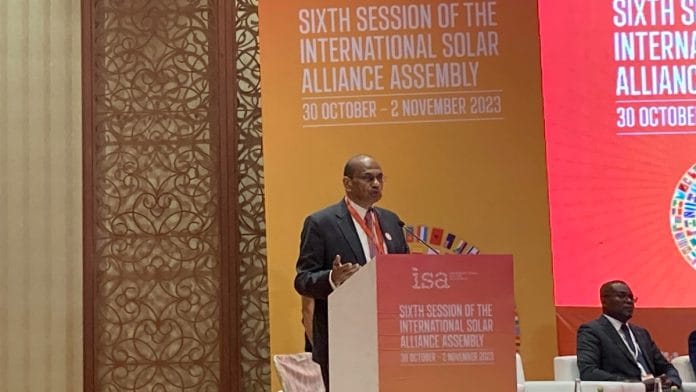New Delhi: India has decided to fund solar energy projects in Africa as part of the International Solar Alliance (ISA) spearheaded by New Delhi and Paris.
Government sources told ThePrint that an in-principle decision has been made to pump in $25 million, but a formal clearance from the Union Cabinet is awaited.
The funding will be as part of the Global Solar Facility (GSF), announced on the sidelines of the Conference of Parties (COP) of the United Nations Framework Convention on Climate Change (UNFCCC) convention held at Sharm-el-Sheikh, Egypt, in November 2022.
India has been keen on initiating projects in Africa as part of New Delhi’s diplomatic outreach to the Global South. Africa is seen as a market for not just Indian exports but also for critical natural resources.
The ISA seeks to promote solar energy globally. The GSF is a body envisaged under the ISA framework to aid both the “‘quality’ (deepen the reach to low-income countries) and ‘quantity’ (multiply the global investments) of solar investments.”
That India has in-principle decided that it will give an anchor contribution to the GSF was confirmed by ISA Director General Ajay Mathur as he spoke to the media Wednesday on the sidelines of the sixth session of the ISA assembly, being held at New Delhi from 30 October to 2 November.
Mathur said the structuring of the GSF has been completed, and the ISA is now looking to raise money to operationalise the fund before the end of the year.
“There are two other philanthropies who have committed to providing resources for this fund. There are three countries with whom discussions are now at an advanced stage,” he said Wednesday. “With six other countries, discussions are at various stages.”
On Tuesday, Union power and new and renewable energy minister R.K. Singh had said at the assembly that India and ISA members will soon operationalise an insurance fund and payment-guarantee fund to ensure finances for solar projects reach countries in Africa.
Mathur said Wednesday that they had “set for ourselves a benchmark of $50 million”.
“What we hope is, that happens in the next few months, within this year itself and following that we are able to raise $100 million for the [payments] guarantee facility, $20 million for the insurance fund facility and $50 million for the seed capital facility by say June of next year [2024],” Mathur added.
Also Read: India pushes for investment in Africa for energy projects at International Solar Alliance meet
Political-risk insurance
India and the ISA have been pushing for investment in energy in Africa, which has high potential for solar energy.
Mathur had Tuesday highlighted that only 3 percent of global investment ($310 billion) in 2022 reached Africa – an investment gap that the ISA is looking to provide solutions for.
In response to a question from ThePrint on how the alliance is looking to reassure investors in a climate of political instability, Mathur said the GSF will be partnering with organisations like the Multilateral Investment Guarantee Agency (MIGA) of the World Bank to provide political risk insurance for projects supported by the facility.
“One of the three elements of the Global Solar Facility is an insurance premium fund. For example, the country signs an agreement with MIGA and we sign an agreement with a company that we will pay x percent of your premium to make solar viable,” Mathur added.
In response to another question on China not being a member of the ISA, Mathur said the alliance “would love” for Beijing to join.
He also said the call for diversification of supply chains for solar energy is a result of the fact that demand is expected to grow three times by 2030, adding that this could increase eightfold if solar hydrogen or electric vehicles “come into the picture”.
“Can we have a supply chain, which is so heavily concentrated [in China]? Our answer is that you need to ensure that there is a more geographically diversified manufacturing picture,” Mathur added.
As part of the efforts of the alliance to build human capacity in least developed countries (LDCs) and small island developing states (SIDS), Mathur said 20 students from member countries in these regions have been pursuing a Master’s education in solar technology at IIT-Delhi. The programme is currently in its fourth batch.
(Edited by Sunanda Ranjan)






